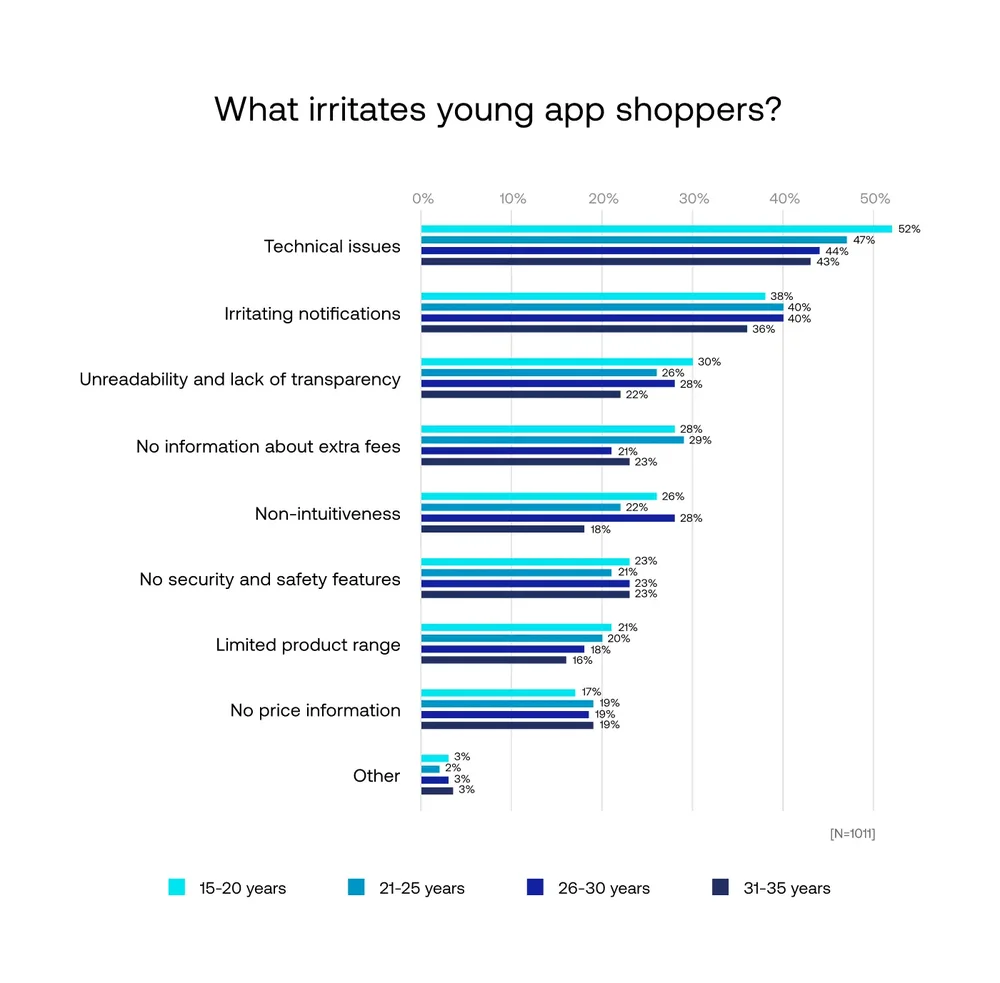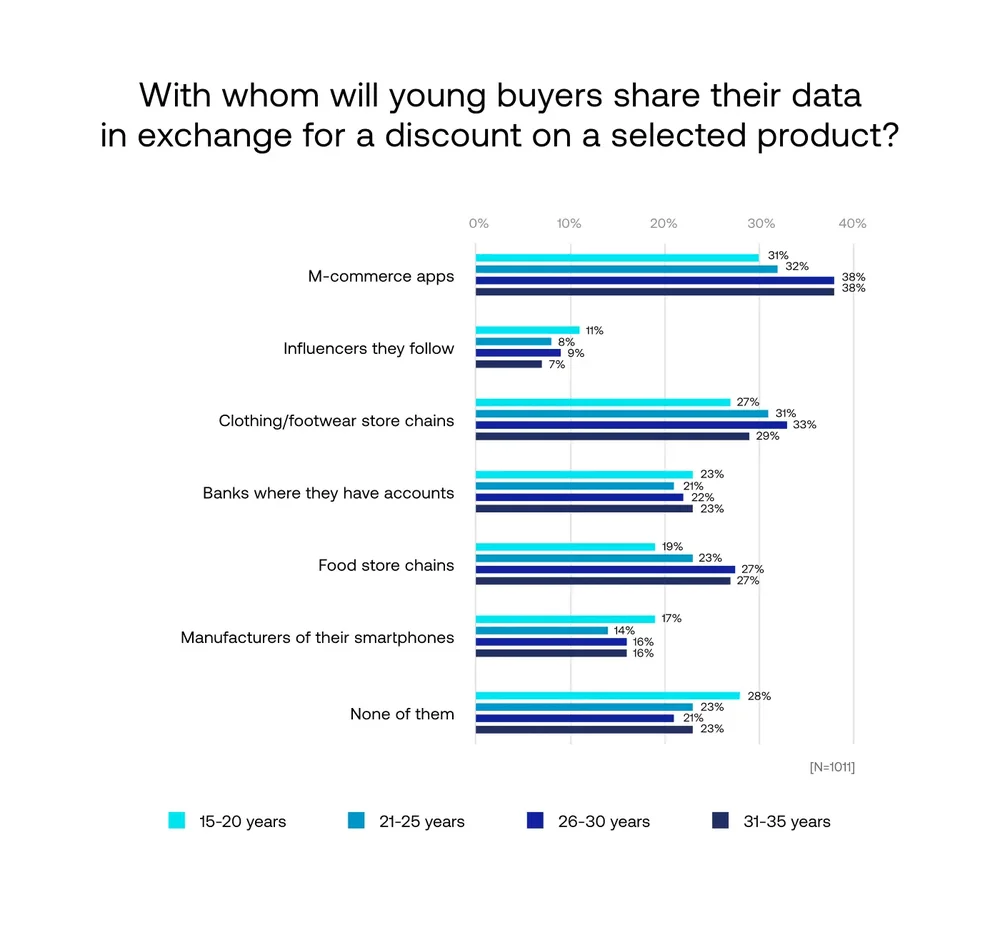
In today's digital age, people are more digitally savvy than ever, relying on mobile devices also to navigate economic uncertainties. For young consumers, smartphones and mobile apps have become indispensable tools that, apart from being convenient to use, should also bring value. As our report “ Młodzi vs Mobile. Wpatrzeni w ekran, czyli o młodych Polakach i technologii mobilnej ” reveals, simply creating an app isn't enough to capture their attention.
Young consumers appreciate seamless and intuitive shopping experiences with personalized recommendations and no irritating notifications. Even though they seem not to place great importance on data protection and privacy, they expect software providers to take care of this aspect for them.
To truly connect with the digital native demographic, businesses need to understand their values, preferences, approach to data sharing, and must-have features that prevent young buyers from abandoning apps.
78% of young consumers (aged 15–35) use smartphones while shopping in brick-and-mortar stores. In recent years, the majority of global players have invested in building or expanding m-commerce applications.
What role does this channel play in the shopping process? A well-designed and thought-out mobile application:
All these have a positive impact on retention and Customer Lifetime Value (CLV).
Young people are more digitally savvy, so their expectations regarding the reliability of applications are higher. 60% of the report respondents use an app once or twice and then abandon it if it doesn't meet their needs or if the offered benefits are one-time only.

As Sam Walton, the founder of Walmart and Sam's Club, once said, the customer deciding where to spend their money ultimately determines the fate of a company. That’s why before creating digital products targeted at young people, it’s crucial to understand their needs. As stated by young consumers participating in our report, a mobile app can attract and retain users if it:
When it comes to privacy… How do young people approach it and what data are they willing to share?

As it’s been already mentioned, most Poles aged 15-20 exercise only basic caution when it comes to personal data protection. Our respondents primarily want to safeguard information about their friends, education, companies they work for, as well as their emails or image.
On the other hand, the data they publish without worries includes their names, surnames, information about music preferences, favorite brands, and events they participate in.
The importance of data protection increases with age and growing awareness of potential breaches or unlawful uses of personal information. While only 7% of Polish individuals aged 15-20 pay no attention to this matter, the figure drops to 3% for the age group of 26-35. Less than 20% of the respondents from the oldest age group (31-35) claim to “make every effort to protect their data”.
Modern consumers demonstrate substantial trust in digital products and software providers that create them. However, it doesn’t mean they’re easily fooled. Once their trust is disappointed, rebuilding it becomes challenging. They are no longer willing to settle for mediocrity. Instead, they expect companies to take decisive actions, be transparent, and value-driven.
The report “Młodzi vs Mobile. Wpatrzeni w ekran, czyli o młodych Polakach i technologii mobilnej” reveals that Poles aged 15-35 approach data contextually and are willing to share it if they know it will bring them benefits.
Based on the respondents' comments, when deciding which data to disclose on a particular channel, they consider the profile and purpose of that channel. They share different data when using apps with job offers and when looking for discounts on their favorite products.
Although it may seem contradictory, buyers aged 15-20, who indicated that they exercise only basic caution regarding data protection, are the least willing to share their data in exchange for shopping discounts. 1/3 of the respondents stated that they wouldn’t disclose their personal information with any app, influencer, retail network, bank or smartphone manufacturer, even for a 50% discount on a chosen product.
Interestingly, financial institutions and smartphone manufacturers don’t enjoy the same level of trust as m-commerce mobile apps. Almost 40% of those aged 26-35 are willing to share personal data with apps in exchange for discounts, whereas only half of them would do the same with their banks.
What about influencer marketing? Only 7% of the respondents aged 31-35 would share personal data with an influencer they follow. This means that investing in the development of intuitive and user-friendly applications can yield greater returns than putting all eggs in the influencer marketing basket. Young people are more conscious than many companies think, they don’t trust omnipresent and ever-present influencers anymore. Instead, they go for solutions that are seamless and delightful to engage with.

Data is one of the most valuable assets for any business, enabling it to build a competitive edge and loyalize consumers. However, there's a flip side to the coin. The relationship with buyers should be a two-way street. Loyalty can't be expected if a business offers only one-time benefits, doesn’t provide convenient interactions with the brand or misuses data.
M-commerce companies should act decently and prioritize user well-being by embracing appropriate design standards. Some countries are already moving the needle in the right direction. They have implemented or are planning to implement suitable regulations to protect users from the so-called “privacy washing”, meaning deceptive tactics that create an illusion of privacy consciousness while potentially falling short of delivering adequate protections.
In 2018, the UK implemented the Age Appropriate Design Code, which includes 15 standards of application, game, service, and other internet-connected device design. The goal is to ensure privacy and security for end-users.
Meanwhile, in California, on July 1st 2024, the Age-Appropriate Design Code Act will come into effect, applicable to any entity creating products and services accessible to children under the age of 18. Based on it, entities producing digital products will have to:
Data privacy issues are becoming increasingly significant – in 2022, companies in the US increased their privacy budgets by an average of 13% (source: Cisco). The standards imposed on global players will undoubtedly have a profound impact on the entire industry.

Up to 90% of consumers wouldn’t buy from an organization that doesn't safeguard their data (source: Cisco) So, just because young users show only basic caution regarding data protection, it doesn't mean that if they knew the companies whose software they use don't provide adequate protection, they wouldn't abandon their services or products.
Prioritizing app usability, customer experience, price competitiveness, and personalization won’t suffice anymore. Transparent data privacy policies and efforts are also essential. It's not only about physically protecting data, it's also about being mindful of the types of data collected and ensuring ethical use of the information, with users' well-being as the primary focus over mere business objectives.
Companies that invest in protecting consumers' privacy not only meet the expectations of digital natives but also stand to gain nearly double the returns on their financial investments. Focusing on data privacy protection makes businesses more mature, innovative, and attractive to investors, so it’s worth addressing this aspect right from the early stages of digital product development.